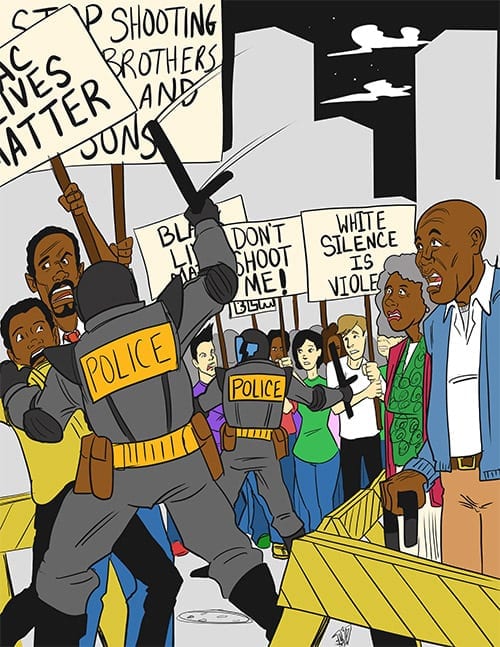
Optimists seem to believe that America’s racial problem can be greatly alleviated by talking. One often hears the assertion that the nation needs “more conversations” on race. There is never a clear explanation as to how the remediation takes effect. The reaction of many whites to the simple claim “black lives matter” should indicate the depth of racial alienation.
How can any civilized person object to the claim that black lives matter? The adverse position is unthinkable. How can anyone really believe that black lives do not matter, or that any human being’s life is of no consequence? The objection of some whites is that an assertion of the value of black lives somehow discriminates against whites.
For years the police across the country have abused African Americans but there has been no right of recourse until video cameras and cellphones have been able to record incidents of police violence. Even then it is rare for the police to be convicted in a court for their violent actions against black victims.
According to a research collaborative called “Mapping Police Violence,” the police killed more than 102 unarmed black victims in 2015. The total number of black people killed by the police in 2015 was 346, but 30 percent were unarmed. “Mapping Police Violence” claims that blacks are three times more likely than whites to be killed by police.
The names of some of the recent victims of police violence have become well-known: Michael Brown, Sandra Bland, Tamir Rice, Lacquan McDonald, Freddie Gray, Eric Garner and Walter Scott. The police have never suffered punishments that fit their crimes of violence, so black youth have organized a national protest — Black Lives Matter.
What also is very disturbing is that whites even seem to accept the high rate of police shootings of whites. The Washington Post recorded 963 fatal police shootings in 2016, and 465 of the victims were white. Perhaps one reason for the white objection to Black Lives Matter is that whites accept the idea of the police shooting any noncompliant citizen regardless of race.
Police shootings are rare in Europe. According to a 2015 report in the Guardian, a British newspaper, there were only 55 fatal police shootings in England and Wales in the last 24 years. In the U.S. there were 59 fatal police shootings in the first 24 days of 2015. While the population of England and Wales is only 56.9 million compared with 316.1 million in the U.S., 5.56 times greater, the disparity in police shootings is enormous. The likelihood of being fatally shot by the police in the U.S. is roughly 365 times greater than in England.
The inexorable conclusion is that respect for human life is far less in the U.S. than in civilized European countries. Unfortunately, a distorted interpretation in the U.S. of the Second Amendment seems to extol firearms in the hands of most citizens. However, one suspects that an analysis of police shootings would find that few Americans in the top 1 percent income bracket ended up on a slab in the morgue as a result of police violence. There is a great deference in the U.S. for the wealthy.
What manner of conversation will modify unpleasant attitudes that have become part of the American culture? The problems facing the nation cannot be overcome with mild pleasantries. If whites learn to understand that black lives matter, perhaps they can also then move on to love one another. Mere conversations will not get us there.


![Banner [Virtual] Art Gallery](https://baystatebanner.com/wp-content/uploads/2024/04/Cagen-Luse_Men-at-store-e1713991226112-150x150.jpg)



